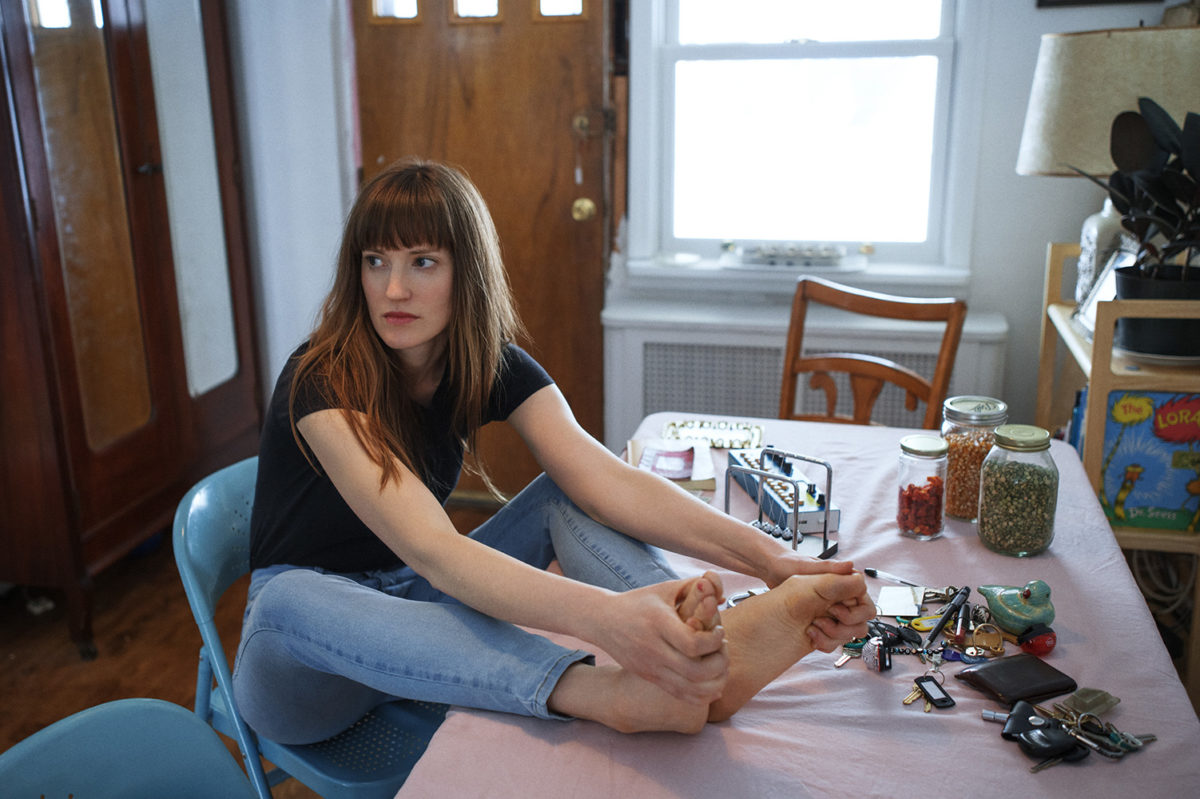Mar
22
with Annie Hart
Fri March 22nd, 2019
7:45PM
Main Space
Minimum Age: 18+
Doors Open: 7:00PM
Show Time: 7:45PM
Event Ticket: $16
Day of Show: $20
Torres

Torres on Facebook | Torres on Twitter | Torres on Soundcloud
When Mackenzie Scott started writing the third TORRES record, Three Futures, she became intrigued by the idea that music could be enjoyed and experienced by all five senses. This concept wasn’t a new fascination, though; after all, the Brooklyn-via-Nashville musician is already known for lighting fragrant Palo Santo on stage before her concerts.
During the writing process, Scott found supporting intellectual inspiration in books: works of fiction (Vladimir Nabokov’s Transparent Things, Ernest Hemingway’s A Moveable Feast, Lorrie Moore, Self-Help), memoirs (Carrie Brownstein’s Hunger Makes Me a Modern Girl, Ta-Nehisi Coates’ Between the World and Me) and even Alejandro Jodorowsky’s Psychomagic: The Transformative Power of Shamanic Psychotherapy. Coates’ book in particular helped inspire one of Three Futures‘ overarching lyrical themes: celebrating the body. “This album is entirely about using the body that each of us has been given as a mechanism of joy,” Scott says. “The body is something to be celebrated; it doesn’t just occupy space. And the record celebrates the space that you’ve been given.”
Three Futures exudes this idea via immersive music. Unlike 2015’s Sprinter, a stark record whose ominous electronic elements largely lurked in the shadows behind deliberate guitars and languid arrangements, Three Futures places mechanized grooves at the forefront. In a nod to the multitude of pleasures hinted at by the record’s theme, Scott’s sonic inspirations are diverse and enveloping: perforated electro-pop static, gothic industrial’s harsh textures and insistent Kraut rock.
Greyscale electronic beats and jagged guitars scrape together like malfunctioning machinery on “Concrete Ganesha,” but coexist peacefully on the Teutonic new wave buzz of “Greener Stretch” and robotic synth-pop of “Skim.” The title track, meanwhile, is a spacious meditation with heartbeat-like rhythms, chilly programmatic shivers and delicate guitar arcs.
Through it all, Scott remains a fluid and expressive vocalist: she employs both a macabre low rumble and a more animated, frantic delivery to convey the contorted desires described in “Helen in the Woods”; exhibits a throaty, hollow timbre on “Marble Focus”; and takes a solemn, reverential approach on “To Be Given a Body.”
“I was listening to tons of Kraftwerk and Can, but also Kate Bush, Portishead and Abba while touring Sprinter,” Scott says. “With Three Futures, I knew I wanted to make my own version of a trance pop record so I used a drum machine to make a beat first for at least half of the new songs, and wrote around the rhythm.”
Three Futures‘ austere foundation crystalized during initial tracking, which took place in Stockport, England, in a studio located outside of the stark manufacturing hub of Manchester with co-producer Rob Ellis (who Scott also worked with on Sprinter). “The basis of the record—the infrastructure if you will—was all recorded there,” Scott says. “Stockport is a cold place—not physically cold, but cold-dark—which definitely fed into the foundation. I was in a surreal mindset for those initial tracking days.”
However, the album was finished in Dorset, England, the same place where she worked on Sprinter. The seaside county’s rolling hills and pastures, not to mention sunnier climate, “fed into the sort of lush, sonically warm elements of the music,” Scott says. “The recording sessions in Dorset gave the record a hope, a warmth and a life. Ultimately, I didn’t want it to be all brittle and stark, and surreal and dark.”
On some level, Scott is used to navigating the collision of disparate sounds. She emerged with 2013’s TORRES — a debut album lauded by everyone from Pitchfork to the The Guardian for its spare arrangements and striking sentiments—and followed that up with Sprinter, which added subtle rhythmic and instrumental heft to her earlier guitar-and-voice compositions, and figured on many major “Best of 2015” lists, including Newsweek, Paste and American Songwriter. She has also developed the live show into an experience NPR’s Bob Boilen praised as “fierce” and “thril[ling for its] wrath and brutal honesty,” when he named TORRES one of his top 5 Favorite Shows of 2015; The Village Voice named TORRES Best Rock Band and Songwriter that year, as well. Scott has opened for artists ranging from Tegan & Sara to one of her heroes, Brandi Carlile, and she played NYC’s MoMA in conjunction with the BRUCE CONNOR: IT’S ALL TRUE exhibition. It should also be noted, her cover of Carlile’s “Until I Die” for the recent tribute album Cover Stories, was featured alongside icons like Adele, Dolly Parton, and Pearl Jam.
For Three Futures, Scott structured her songwriting in a meticulous, inventive way. To begin, she pictured a ten-room house. Each room in this figurative house possessed distinct smells, foods and colors, and corresponded to a different song she would write for Three Futures. To take the symbolism to another level, Scott also envisioned the house representing the subconscious; each song, by extension, symbolized a different manifestation of the subconscious.
“I wanted each song to be a completely consuming experience,” Scott says. “’In this world that I’m creating, what if someone could listen to this song and not only experience it with their ears—but also with their eyes, taste buds, hands, feet, and nose? What if they could smell it?”
As a result, Three Futures is vivid and surreal. Inanimate objects take on human characteristics—throughout “Bad Baby Pie,” Scott declares repeatedly, “I’ll make it worth every last bite/Of that bad baby pie”—while vivid imagery (“You moved like a sunroom/Bracing for Sunday evening”) provides depth. References to aromatic scents (“bergamot perfume” on the title track) and vibrant hues (a “Cadillac green”-lit couple on “Concrete Ganesha”) add luminous lyrical detail.
Elsewhere, the concept of duality also crops up again, in the contrast between carnal desire and self-denial in “Righteous Woman,” for example, or the embrace of life after a near-death experience in “Greener Stretch.” This corporeal joy comes with a caveat: Scott also describes a companion visual motif for Three Futures involving “arriving to the party a century too late.”
“It’s this idea that we can only exist within this time and this space that we’ve been given,” Scott explains, noting there’s a tension that arises when people can’t go back in time or choose parallel futures. “There’s a sense of futility inherent to trying to manipulate time, manipulate tenses, and manipulate things that we cannot control. That theme permeates the album as a whole. Yet there’s a maniacal sense of having to choose joy despite our complete helplessness.”
In one sense, Three Futures can be considered both aspirational and fatalistic—the promise of a bright future and a rug yanked out from underneath. But the record encourages the pursuit of bodily pleasures despite these limits, and embraces ecstasy, desire and indulgence rather than self-denial. Three Futures is permeated by vivacious sonic and spiritual decadence.
“I love a record that unfolds over time, and blooms in ways that someone couldn’t have imagined on the first, second or even tenth listen,” Scott says. “That’s what makes a classic album—and that’s what I was after.”
Annie Hart

Annie Hart Official Website | Annie Hart on Facebook | Annie Hart on Soundcloud | Annie Hart on Twitter | Annie Hart on Instagram
Annie Hart is best known as one-third of Au Revoir Simone, the beloved all-female synth trio that counts David Lynch as a superfan. But with the eight tracks on her solo debut, “Impossible Accomplice” (Instant Records, September 15), Annie will emerge as an electrifying artist and producer in her own right. Her live show is filled with lush synthesizer sounds and captivating intimate vocals, and has been known to leave her audience in a trance.
During the band’s hiatus, she has been crafting pop songs on classic synthesizers, with a less-is-more approach, writing and engineering the record on her own in the basement of her Brooklyn home, sneaking sessions in while her children were sleeping. Greatly influenced by the spare synthesizer sounds of Laurie Spiegel and the post-punk sensibility of artists like Tubeway Army, Annie has embraced her love of meticulously crafting the perfect tone to match the emotion of a song. “Be it melancholy, longing, happiness or simple desire, there is no better way to explain my innermost world than by going past words and into the intuitive and visceral feeling that a particular sound can evoke.”
In songs such as the first single, “Hard To Be Still” (featured on an upcoming episode of Netflix series, Gypsy, starring Naomi Watts), Annie cuts back the layers to reveal a rawer version of the dreamy synth pop her band was famous for forging. Solo, Annie has opened for artists such as M. Ward and Neko Case, and will be playing a handful of shows this summer in support of the new record.

